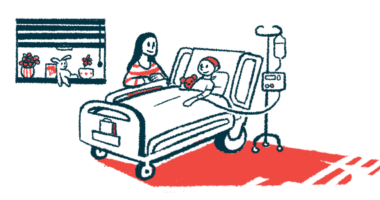FDA grants Poseida’s CAR T-cell therapy RMAT status for RRMM
Regenerative medicine advanced therapy status aims to speed development

The U.S. Food and Drug Administration (FDA) has granted regenerative medicine advanced therapy (RMAT) status to P-BCMA-ALLO1, Poseida Therapeutics‘ experimental CAR T-cell therapy for adults with relapsed or refractory multiple myeloma (RRMM).
The designation is specifically indicated for treating patients who have relapsed or failed to respond after receiving at least three lines of therapy, including a proteasome inhibitor, an immunomodulatory agent, and an anti-CD38 antibody.
Based on preliminary data from an ongoing Phase 1/1b clinical trial (NCT04960579), the RMAT status aims to speed the therapy’s development and review by providing certain benefits.
These include early and frequent interactions with the FDA, and potential eligibility for accelerated approval, which allows a therapy to be marketed based on preliminary clinical trial data that predicts long-term efficacy. Full approval is then dependent on further trial results confirming the therapy’s benefits.
“The RMAT designation for P-BCMA-ALLO1, our lead program, is based on impressive early clinical data from our ongoing Phase 1 study and further validates its potential to address the unmet needs of patients with relapsed/refractory multiple myeloma,” Kristin Yarema, PhD, president and CEO of Poseida, said in a company press release.
The company plans to share new data from the Phase 1 study in an oral presentation at the 21st International Myeloma Society Annual Meeting, which will be held in Brazil at the end of the month.
RMAT designation for P-BCMA-ALLO1 follows orphan drug status
P-BCMA-ALLO1 is a CAR T-cell therapy Poseida developed in partnership with Roche. This type of treatment involves collecting a person’s immune T-cells and modifying them in the lab to carry a chimeric antigen receptor, or CAR, that can recognize specific cancer proteins. The modified cells are then delivered to patients by infusion to target and kill cancer cells.
This therapy is specifically designed to recognize BCMA, a protein highly present at the surface of myeloma cells. Once the delivered engineered T-cells bind to BCMA, they are activated to kill the myeloma cells, leaving healthy cells — those with no or reduced amounts of that protein — largely unharmed.
The treatment’s predecessor, dubbed P-BCMA-101, was an autologous therapy, meaning T-cells were collected from each patient, modified to recognize BCMA, and then delivered back to the same individual to destroy myeloma cells.
P-BCMA-101 also had been granted the FDA’s RMAT designation for treating patients with RRMM. That award was based on preliminary positive data from a Phase 1 trial (NCT03288493).
With both RMAT and orphan drug designations for P-BCMA-ALLO1, we look forward to working closely with the FDA as we continue to advance this next-generation, off-the shelf allogeneic CAR-T therapy.
P-BCMA-ALLO1 is the result of Poseida’s subsequent focus on allogeneic CAR T-cell therapies, in which T-cells are instead obtained from healthy donors, supporting a so-called off-the-shelf (ready-to-use) therapy that would improve patient access.
The collected T-cells are genetically modified using the company’s proprietary piggyBac gene editing platform. This virus-free approach allows for the production of a highly pure population of T memory stem cell, which are rapidly growing T-cells capable of sustaining the therapy’s effect.
Also, the therapy contains a switch so that it can be rapidly reduced or eliminated in the event of dangerous side effects. A small molecule called rimiducid activates the switch, which may be administered as indicated.
P-BCMA-ALLO1 also received the FDA’s orphan drug designation, which comes with regulatory support and, if the therapy is approved, seven years of market exclusivity.
“With both RMAT and orphan drug designations for P-BCMA-ALLO1, we look forward to working closely with the FDA as we continue to advance this next-generation, off-the shelf allogeneic CAR-T therapy, including the recently initiated Phase 1b portion of the trial,” Yarema said.
Poseida reports on patient, 57, given predecessor CAR T-cell therapy
Poseida’s RMAT application was based on promising early data from its ongoing U.S.-based Phase 1/1b study. In its first Phase 1 portion, the overall response rate was 82%. The response rate was 100% among patients who had not previously received a BCMA-targeted therapy.
“Our data [have] shown clinical responses in very sick, refractory patients, including those that have received prior BCMA-targeted therapies,” Yarema said.
The recently started Phase 1b portion aims to expand the patient and treatment groups further to help select a recommended dose for a future Phase 2 trial.
Poseida also recently reported the case of a 57-year-old woman with RRMM given P-BCMA-101 — a case the company said demonstrates how stem cell memory T-cells were a key differentiator for its CAR T-cell programs.
In a separate press release on that case, the company noted that the woman achieved a complete response, and remained in remission for nearly two years. More than three years after treatment, she relapsed and received the approved T-cell engaging (TCE) antibody Talvey (talquetamab). Blood tests revealed re-growth of P-BCMA-101 CAR T-cells, and more than nine months later, she continues to be in remission and off all therapies, the company reported.
“We believe this is the first time that a T-cell engager has been seen to reactivate a CAR-T therapy, and the evidence suggests that this reactivation drove a second wave of CAR-T cell proliferation that led to another complete response three years after the initial successful CAR-T treatment,” said Thomas G. Martin, MD, clinical professor of medicine at the University of California, San Francisco. “This patient is now off all anti-myeloma treatments and living in remission for more than nine months following 1 week of TCE therapy.”
Martin called this “a truly amazing outcome.”








